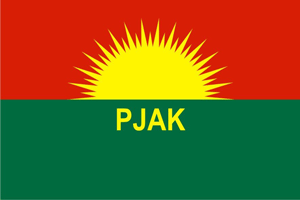 QENDIL, Defence Zones of Medya, — In a written statement the coordination of Kurdistan’s Free Life Party (PJAK), venerated the martyrs of 9 May, Ferzad Kemangir, Shirin Elemboli, Ferhad Wekili, Eli Heyderiyan and Mehdi Islamiyan who were executed on 9 May 2010.
QENDIL, Defence Zones of Medya, — In a written statement the coordination of Kurdistan’s Free Life Party (PJAK), venerated the martyrs of 9 May, Ferzad Kemangir, Shirin Elemboli, Ferhad Wekili, Eli Heyderiyan and Mehdi Islamiyan who were executed on 9 May 2010.
“9 May marked a significant step in the history of our people and a stunning point in the annals of our national struggle in the East Kurdistan,” the statement remarked.
Coordination of PJAK states that the 9 May do not only indicate the oppression of the Kurdish people at the hands of some of the most brutal states in the Middle East, but it also points to the resistance the Kurds have manifested against such oppressions.”Understanding the nature and essence of the struggle of 9 May in Evin prison, would help comprehend perspective of Kurdish struggle bent on ending colonialism and securing freedom,” the statement added.
Pointing to the Turkey—Iran relationship and the role the Kurds can play in democratisation of Iran, the statement asserts,” Martyr Kemangir clearly identified their execution verdicts as a wedding present Iran would give to Turkey. The struggles of these comrades indicated the pioneering role the Kurds have taken in the campaign for democracy in Iran. Any of these comrades saw the denial of the Kurds as the main obstacle on the trend of democratisation. They regarded the Kurdish struggle for freedom and democracy as that of all the oppressed peoples and based on that they shared the pains and sufferings of all relegated identities and the oppressed peoples of Iranian society.”
Within the statement the coordination of PJAK do also points to the struggle of Shirin Elemholi as the only woman among the five martyrs of 9 May remarking, “The struggle for freedom of women in the personality of Shirin Elemholi as the representative of free women from East Kurdistan marked a turning point. Presentation of feminine will-power in front of the dominant and torturing masculine, leading to the ultimate triumphant of feminine will-power in the personality of this martyr was a great leap in the struggle for the freedom of women in East Kurdistan.”
With their own martyrdom—the statement continues— the martyrs of 9 May made manifest all the hypocritical politics and the silent of the modern world in the face of the physical and cultural genocide of the Kurdish people.
At the end of the statement PJAK observes that,” We as the comrades and companions of the martyrs of 9 May have learned from their struggle that, unless the strategies of massacres, colonialism and cultural assimilation are pursued by the occupying powers of Kurdistan, the struggle of 9 May will reoccur in our resistance.”